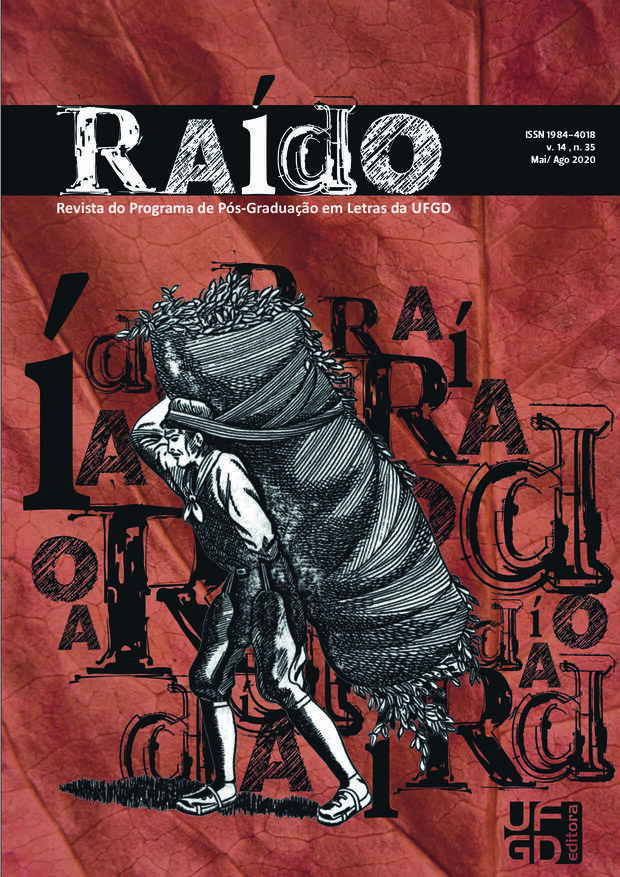To consume and to be consumed, new perspectives about the relation between humans and animals in the contemporary latin american literature
DOI:
https://doi.org/10.30612/raido.v14i35.11041Keywords:
Contemporary Latin American Literature. Agustina Bazterrica. Ecopolitics. State of Exception.Abstract
Ecopolitics can be understood as a new field of production of knowledge and power related to government technologies of the world that affect relations between capitalism and environment and between democracy and the management of the planet. One of the dimensions of the Ecopolitics is the statement, expansion and consolidation about animals rights as the basis on the ethical coexistence of the species, mainly the discussions of the frontier between humanity/animality. All the same time the Ecopolitics development, there is also the continuous insertion of State of Exception as a contemporary form of government, indistinction limit between law and violence that can turn any citizen into homo sacer (Agamben, 2002). Those are two constitute dimensions the dystopian book Cadáver Exquisito (2018) of the contemporary Argentine writer Agustina Bazterrica. In this article, we intend to analyse as they appear in the author’s novel: a) The State of Exception legitimation; and b) Frontier between humanity/animality and the dimension of ecopolitics in the novel. For this purpose, we used theoretical contributions as Giorgio Agamben, Peter Sloterdijk, Michel Foucault, Gabriel Giorgi and others. From the novel analysis, we observed that the problematization of the ontological difference between human and animal points to a contemporary trend of animal humanization, when animals are elevated to a qualified life. Meanwhile, in the relationship between human beings, the definition and standardization of the boundaries of what is human are highlighted, and those who exceed such frontiers are relegated to a bare life.Downloads
References
AGAMBEN, Giorgio. Estado de exceção. Tradução Iraci D. Poleti. São Paulo: Boitempo, 2004.
AGAMBEN, Giorgio. Homo Sacer: o poder soberano e a vida nua. v. I. Tradução Henrique Burigo. Belo Horizonte: UFMG, 2002.
ARISTÓTELES. Política. Tradução Roberto Leal Ferreira. São Paulo: Nova Cultural, 1999.
BAZTERRICA, Agustina. Agustina María Bazterrica y su “Cadáver Exquisito” en la FILBO 2019. [Entrevista concedida a] Periódico El Espectador, Colômbia. 26 de abril de 2019. Disponível em: https://www.elespectador.com/noticias/cultura/agustina-maria-bazterrica-y-su-cadaver-exquisito-en-la-filbo-2019-articulo-852411. Acesso em: 29 jul. 2019.
BAZTERRICA, Agustina. Cadáver Exquisito. 3ª ed. Ciudad Autónoma de Buenos Aires: Arte Gráfico Editorial Argentino, 2018.
BÍBLIA. A. T. Gênesis. In: BÍBLIA. Bíblia sagrada: contendo o antigo e o novo testamento. Tradução João Ferreira de Almeida. São Paulo: Geográfica Editora, 2014.
BRASIL. Constituição da República Federativa do Brasil de 1988. Disponível em: http://www.planalto.gov.br/ccivil_03/constituicao/constituicaocompilado.htm. Acesso em: 09 nov. 2019.
DECLARAÇÃO UNIVERSAL DOS DIREITOS DOS ANIMAIS. Assembleia Geral das Nações Unidas em Bruxelas - ONU e UNESCO. 27 de jan. 1978. Disponível em: http://www.urca.br/ceua/arquivos/Os%20direitos%20dos%20animais%20UNESCO.pdf. Acesso em 16 nov. 2019.
DECLARAÇÃO UNIVERSAL DOS DIREITOS HUMANOS. Assembleia Geral das Nações Unidas em Paris. 10 dez. 1948. Disponível em: https://www.ohchr.org/EN/UDHR/Pages/Language.aspx?LangID=por. Acesso em 10 nov. 2019.
FOUCAULT, Michel. A verdade e as formas jurídicas. Tradução Roberto Machado e Eduardo Jardim. Rio de Janeiro: NAU, 2002.
FRANCIONE, Gary. L. (2010). Animal Welfare and the Moral Value of Nonhuman Animals. Law, Culture and the Humanities, 6(1), 24-36. Disponível em http://www.law.uvic.ca/demcon/2012%20readings/animal%20welfare.pdf. Acesso em 10 nov. 2019.
GIORGI, Gabriel. Formas comuns: animalidade, literatura, biopolítica. Tradução Carlos Nougué. Rio de Janeiro: Rocco, 2016.
LOCKE, John. Segundo tratado sobre o governo civil: ensaio sobre a origem, os limites e os fins verdadeiros do governo civil. Tradução Magda Lopes e Marisa Lobo da Costa. Petrópolis, RJ: Vozes, 1994
LOS SIETE LOCOS. Entrevista a Agustina Bazterrica y Mariano Quirós. Buenos Aires: Televisión Pública Argentina, 03 de jan. de 2018. Disponível em: https://www.youtube.com/watch?v=6XGVlacDtLM. Acesso em 18 de nov. 2019.
MBEMBE, Achille. Necropolítica: biopolítica, soberania, estado de exceção, política da morte. Tradução Renata Santini. São Paulo: n-1 edições, 2018.
PERRONE-MOISÉS, Leyla. Mutações da literatura no século XXI. São Paulo: Companhia das Letras, 2016.
SINGER, Peter. Libertação animal. Tradução Marly Winckler e Marcelo Brandão Cipolla. São Paulo: Martins Fontes, 2000.
SLOTERDIJK, Peter. Regras para o parque humano: uma resposta à carta de Heidegger sobre o humanismo. Tradução José Oscar de Almeida Marques. 4ª ed. São Paulo: Estação Liberdade, 2018.
Downloads
Published
How to Cite
Issue
Section
License
Os autores devem aceitar as normas de publicação ao submeterem a revista, bem como, concordam com os seguintes termos:
(a) O Conselho Editorial se reserva ao direito de efetuar, nos originais, alterações da Língua portuguesa para se manter o padrão culto da língua, respeitando, porém, o estilo dos autores.
(b) Autores mantém os direitos autorais e concedem à revista o direito de primeira publicação, com o trabalho simultaneamente licenciado sob a Atribuição-NãoComercial-CompartilhaIgual 3.0 Brasil (CC BY-NC-SA 3.0 BR) que permite: Compartilhar — copiar e redistribuir o material em qualquer suporte ou formato e Adaptar — remixar, transformar, e criar a partir do material. A CC BY-NC-SA 3.0 BR considera os termos seguintes:
- Atribuição — Você deve dar o crédito apropriado, prover um link para a licença e indicar se mudanças foram feitas. Você deve fazê-lo em qualquer circunstância razoável, mas de nenhuma maneira que sugira que o licenciante apoia você ou o seu uso.
- NãoComercial — Você não pode usar o material para fins comerciais.
- CompartilhaIgual — Se você remixar, transformar, ou criar a partir do material, tem de distribuir as suas contribuições sob a mesma licença que o original.
- Sem restrições adicionais — Você não pode aplicar termos jurídicos ou medidas de caráter tecnológico que restrinjam legalmente outros de fazerem algo que a licença permita.



